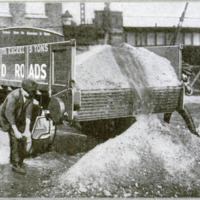An apparatus designed by British engineers to unload the material used for road maintenance
Contenuto
-
Titolo
-
An apparatus designed by British engineers to unload the material used for road maintenance
-
Article Title and/or Image Caption
-
Turn a Crank and Shovel Out the Load
-
extracted text
-
It was not long after the beginning
of the war when the British Royal
Engineers, intrusted with keeping
French roads in shape, found that they
would have to devise some unloading
means for handling road material.
It was this condition that led Lieu-
tenant W. Owen
Wilkins to invent
the unloading de-
vice here illustra-
ted. One of the
main advantages
of the equipment
is that it can be
applied to any
truck withoutany
changes in the
body itself, suchas
would be neces-
saryif thecommon
type of American
body hoist were
employed.
About four hun-
dred of the un-
loaders have been
fitted on British
trucks, and a like
number on the
American vehi-
cles serving with
the United States
Engineer Corps.
The success ob-
tained with the
apparatus may be gaged by one
test in which two men unloaded a
three-ton load of ballast in thirty
seconds.
The apparatus consists of a flexible
false bottom, which is placed inside of
the ordinary body and supported on
longitudinal metal skids placed on
wood sills placed lengthwise. The
false bottom carries the load, and is
provided with a_ vertical steel plate
near the front end of the body.
The entire false bottom, which is
made up of latihs or sluts of steel
mounted on a
flexible base, is
moved backward
and over a roller
at the rear and
slightly above
the end of the
truck-frame and
thence down and
around a roller
underneath.
This winding
up of the false
bottom, which is
effected by two
men working
crank handles,
moves the verti-
cal steel plate
backward, shov-
ing ahead of it all
the material
carried and push-
ing it off on to
the ground. A
wire rope brings
the plate back to
the front for the
next load.
-
Lingua
-
eng
-
Data di rilascio
-
1919-02
-
pagine
-
58
-
Diritti
-
Public domain (Google digitized)
-
Archived by
-
Davide Donà
-
Marco Bortolami (editor)
 Screenshot (541).png
Screenshot (541).png